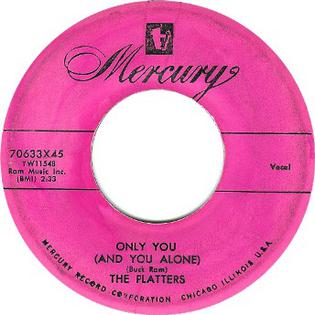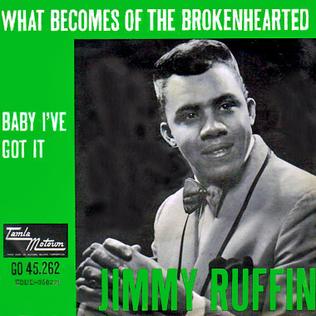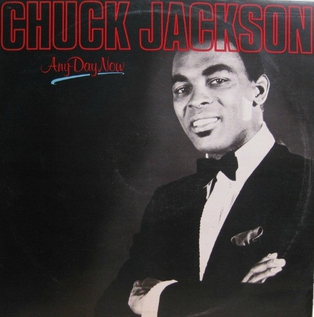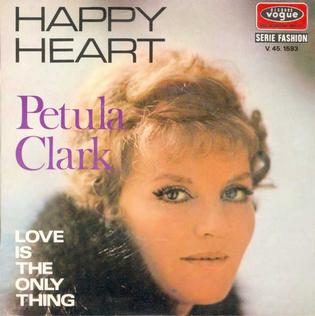Related Research Articles

"Only You (And You Alone)" (often shortened to "Only You") is a pop song composed by Buck Ram. It was originally recorded by The Platters with lead vocals by Tony Williams in 1955.

"When a Man Loves a Woman" is a song written by Calvin Lewis and Andrew Wright and first recorded by Percy Sledge in 1966 at Norala Sound Studio in Sheffield, Alabama. It made number one on both the Billboard Hot 100 and R&B singles charts. Country singer John Wesley Ryles had a minor hit with his version of the song in 1976. Singer and actress Bette Midler recorded the song and had a Top 40 hit with her version in 1980. In 1991, Michael Bolton recorded the song and his version peaked at number one on both the Billboard Hot 100 chart and the Billboard Adult Contemporary Singles chart.

"Since I Don't Have You" is a song written and composed by Jackie Taylor, James Beaumont, Janet Vogel, Joseph Rock, Joe Verscharen, Lennie Martin, and Wally Lester. It was first a 1958 hit single for the doo-wop group the Skyliners on the Billboard Hot 100. Country music singer Ronnie Milsap had a hit with the song in 1991. American hard rock band Guns N' Roses also had some success in 1994 with their version of the song which reached the top 10 on the UK Singles Chart.

"What Becomes of the Brokenhearted" is a hit single recorded by Jimmy Ruffin and released on Motown Records' Soul label in the summer of 1966. It is a ballad, with lead singer Jimmy Ruffin recalling the pain that befalls the broken-hearted who had love that's now departed. The song essentially deals with the struggle to overcome sadness while seeking a new relationship after a breakup.

"To Sir with Love" is the theme from James Clavell's 1967 film To Sir, with Love. The song was performed by British singer and actress Lulu, and written by Don Black and Mark London. Mickie Most produced the record, with Mike Leander arranging and conducting. The song peaked at the top of the Billboard Hot 100, and became the best-selling single of 1967 in the United States.

"The End of the World" is a pop song written by composer Arthur Kent and lyricist Sylvia Dee, who often worked as a team. They wrote the song for American singer Skeeter Davis, and her recording of it was highly successful in the early 1960s, reaching the top five on four different charts, including No. 2 on the main Billboard Hot 100. It spawned many cover versions.
"Sweet Dreams" or "Sweet Dreams (of You)" is a country ballad, which was written by Don Gibson. Gibson originally recorded the song in 1955; his version hit the top ten of Billboard's country chart, but was eclipsed by the success of a competing recording by Faron Young. In 1960, after Gibson had established himself as a country music superstar, he released a new take as a single. This version also charted in the top ten on the country chart and also crossed over to the Billboard Hot 100, where it peaked at No.93. The song has become a country standard, with other notable versions by Patsy Cline and Emmylou Harris.

"Cast Your Fate to the Wind" is an American jazz instrumental selection by Vince Guaraldi; later, a lyric was written by Carel Werber. It won a Grammy Award for Best Original Jazz Composition in 1963.

"Drivin' My Life Away" is a song co-written and recorded by American country music artist Eddie Rabbitt. It was released in June 1980 as the first single from the album Horizon. The song was written by Rabbitt, Even Stevens and David Malloy.

Bossa Nova Hotel is the 1983 debut album of rock singer/guitarist Michael Sembello. The album was a continuation of the work that Sembello began with producer Phil Ramone on "Maniac," which became a number one US pop hit after it was featured in the film Flashdance and on its soundtrack album. Bossa Nova Hotel peaked at number 80 on the US album chart and included the soundtrack hit in addition to two more chart entries, "Automatic Man" and "Talk."
"Somewhere", sometimes referred to as "Somewhere (There's a Place for Us)" or simply "There's a Place for Us", is a song from the 1957 Broadway musical West Side Story that was made into films in 1961 and 2021. The music is composed by Leonard Bernstein with lyrics by Stephen Sondheim.

"All This Love" is a single by DeBarge, released on October 17, 1982. The song was released as the third and final single from their second studio album of the same title on the Gordy label. The single would help DeBarge rise to R&B stardom. A cover version of the song was recorded by Patti LaBelle on her 1994 gold album Gems. A video for her version was also filmed.

"Any Day Now" is a popular song written by Burt Bacharach and Bob Hilliard in 1962. It has been recorded by numerous artists over the years, including notable versions by Chuck Jackson in 1962, Alan Price in 1965, Elvis Presley in 1969, Scott Walker in 1973 and Ronnie Milsap in 1982. In the lyrics, the singer predicts the imminent demise of a romantic relationship and describes the sadness this will leave.
"What About Me?" is a 1984 song written by Kenny Rogers, producer David Foster, and singer-songwriter Richard Marx, and recorded by Rogers, Kim Carnes, and James Ingram as a trio song from Rogers' 1984 album of the same name. It was the lead single from the album and reached at number 15 on the US Billboard Hot 100 chart and at number one on the US Adult Contemporary chart, Marx's first number one hit as a songwriter.

"Crying Time" is a song from 1964 written and originally recorded by the American country music artist Buck Owens. It gained greater success in the version recorded by Ray Charles, which won two Grammy Awards in 1967. Numerous other cover versions have been performed and recorded over the intervening years.

"What Kind of Fool" is a 1981 vocal duet by singers Barbra Streisand and Barry Gibb. The song was written by Gibb and Albhy Galuten. Released as the third single from Streisand's album Guilty (1980), "What Kind of Fool" was the third consecutive top ten single from the album in the United States. "Woman in Love" reached number one on the Billboard Hot 100 chart, and the album's title track reached number three, both in late 1980. "What Kind of Fool" spent three weeks at number ten on the Hot 100 in March and April 1981. It also spent four weeks atop the Billboard adult contemporary chart.
"I Love You Because" is a song written and recorded by country music singer-songwriter Leon Payne in 1949. The song has been covered by several artists throughout the years, including hit cover versions by Al Martino in 1963 and Jim Reeves in 1964.

"Happy Heart" is a song written by James Last and Jackie Rae. Versions of the song by Petula Clark and Andy Williams charted simultaneously in 1969 and had their best showings on Billboard magazine's Easy Listening chart, where Clark peaked at number 12 and Williams spent two weeks at number 1.

"It's a Miracle" is a 1975 single by Barry Manilow and was the second release from his album, Barry Manilow II. "It's a Miracle" went to number twelve on the U.S. Billboard Hot 100 and was Manilow's second number one on the U.S. Easy Listening chart, spending one week at number one in April 1975. The single also peaked at number fifteen on the disco/dance chart, and was the first of four entries on the chart. "It's a Miracle" was followed by "Could It Be Magic".

"Sea of Heartbreak" is a song written by Paul Hampton and Hal David and recorded by Don Gibson in 1961. The song reached #2 on the Billboard Hot Country Singles & Tracks chart.
References
- 1 2 3 Roberts, David (2006). British Hit Singles & Albums (19th ed.). London: Guinness World Records Limited. p. 135. ISBN 1-904994-10-5.
- ↑ Whitburn, Joel (2002). Top Adult Contemporary: 1961-2001. Record Research. p. 259.
- ↑ Whitburn, Joel (2009). Top Pop Singles, 12th Edition. Record Research.